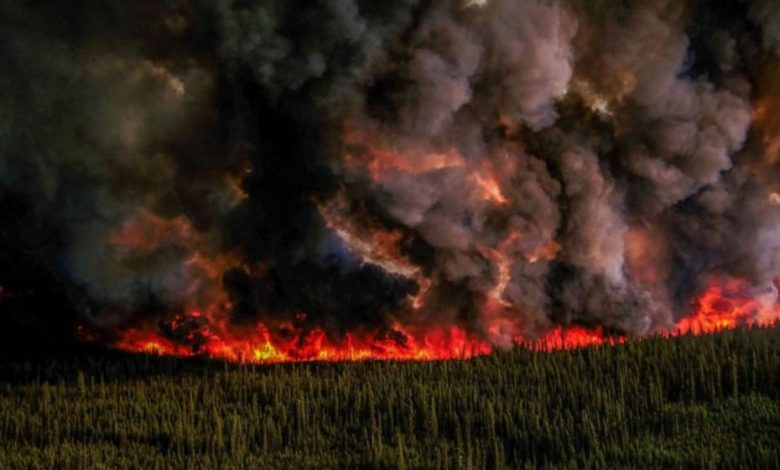There are Now 250 “Out-of-Control” Fires in Canada, Here’s Why Some Say It’s All ‘Planned’

Massive wildfires have rapidly spread across the Canadian province of Quebec, fueled by dry and hot weather conditions and multiple lightning strikes. The number of fires escalated from 36 to over 100 following a thunderstorm on June 1st, catching authorities off guard. As of Thursday, that massive conflagration has gotten worse. Much, much worse. And the flames are spreading.
Trace Gallagher of Fox News gave a sobering update on Thursday about the unprecedented scale of the wildfires in Canada, which have ravaged through the forested countryside and has dealt severe damage to air quality throughout the northeast.
Wait- how many fires! pic.twitter.com/TYrbldKqG6
— Karli Bonne’ (@KarliBonnita) June 7, 2023
“While most fires in the Western provinces are under control, the fires have now opened new fronts spreading to eastern provinces of Nova Scotia, Quebec, and Ontario. Right now, there are 437 active fires with about 250 out-of-control. About 26,000 Canadians have evacuated their homes because of the fires. And experts say the hazardous conditions in New York City are the worst on record.”
A Tik Tok user named Al Vanchon had his own beliefs about why the raging wildfires may be suddenly spreading throughout the Canadian wilderness.
There are 250 “out-of-control” wildfires now raging across Canada.
This Tik Tok user believes he may know why. pic.twitter.com/LatPyIGgEc
— Kyle Becker (@kylenabecker) June 8, 2023
“If you haven’t heard the latest up here in Canada, BC’s on fire, the East Coast is on fire, and now Quebec,” he said. “Quebec all in one day, the entire province caught fire on a beautiful day.”
“This is planned, and I’ll tell you why it’s planned,” he continued. “They want to move people out of the countryside, into cities, then they want to lock ’em down in 15 minutes cities. How do you do that? Contaminate the air, contaminate the water, and so on.”
“This is all a ploy and a plan to get people into cities to implement their smart cities,” he added. “And it’s the only way they can control you. First, they have to go to digital currency and get you into smart cities. This is happening and this is real. This is evil. This is pure evil.”
The official line on how the wildfires in Canada started are that lightning strikes and unseasonably warm weather are to blame. There are many officials attempting to blame “climate change” for the wildfires.
’15-minute cities’ are a relatively new concept. The idea is to build cities in such a way that “most daily necessities and services are located within a 15-minute walk or bike ride.” Carlos Moreno, urbanist and professor at the Sorbonne University in Paris, first came up with the idea in 2016 so that most people would have easy access to shops, schools, doctors, the gym, parks, restaurants and cultural institutions.
Benjamin Büttner, mobility expert at the Technical University Munich, told DW ideas that “in order to create more sustainable cities, things like green spaces, places to do sport, cinemas and shops need to be moved to where people live, not vice versa. And that doesn’t mean they have to be demolished and rebuilt, but that already existing public space needs to be rearranged.”
“The 15-minute city also offers a mobility concept: fewer cars and more space for cyclists and pedestrians, safe paths for children, people with disabilities or the elderly and places for social interaction,” the story added.
“Cars are a problem, at least in urban centers. They take up too much space and they can hamper active mobility,” Büttner said.
The 15-minute cities concept appears to relate much more to reconstructing already existing urban areas than moving people from the countryside into urban areas.
There has been a considerable “global response” to the Canadian fires. In addition to around 110 firefighters from France, 600 firefighters from the United States are en route to Canada, with some expected to arrive in Quebec next week. However, a new challenge has arisen as some fires have grown so large that they are merging with others, presenting a difficult challenge for firefighters.
With over 280,000 hectares (691,900 acres) of land already consumed by the fires, this is already Quebec’s most severe fire season to date. The Canadian province is grappling with wildfires on an unprecedented scale, a phenomenon more commonly associated with regions in western Canada such as Alberta and British Columbia.
The fires have already sparked a talking point among climate activists and politicians who claim without evidence that the wildfires have indirectly been caused by human activity. While others are much more accusatory in their linkage of human activity to the fires.
In summary, civilian distrust of the government is at an all-time high following the authoritarian Covid response, the ensuing lockdowns, the mask mandates, and the vaccine mandates. It is unsurprising but unfortunate that any time there is a national emergency, the first response for millions of people now is to suspect the government is somehow behind it.


